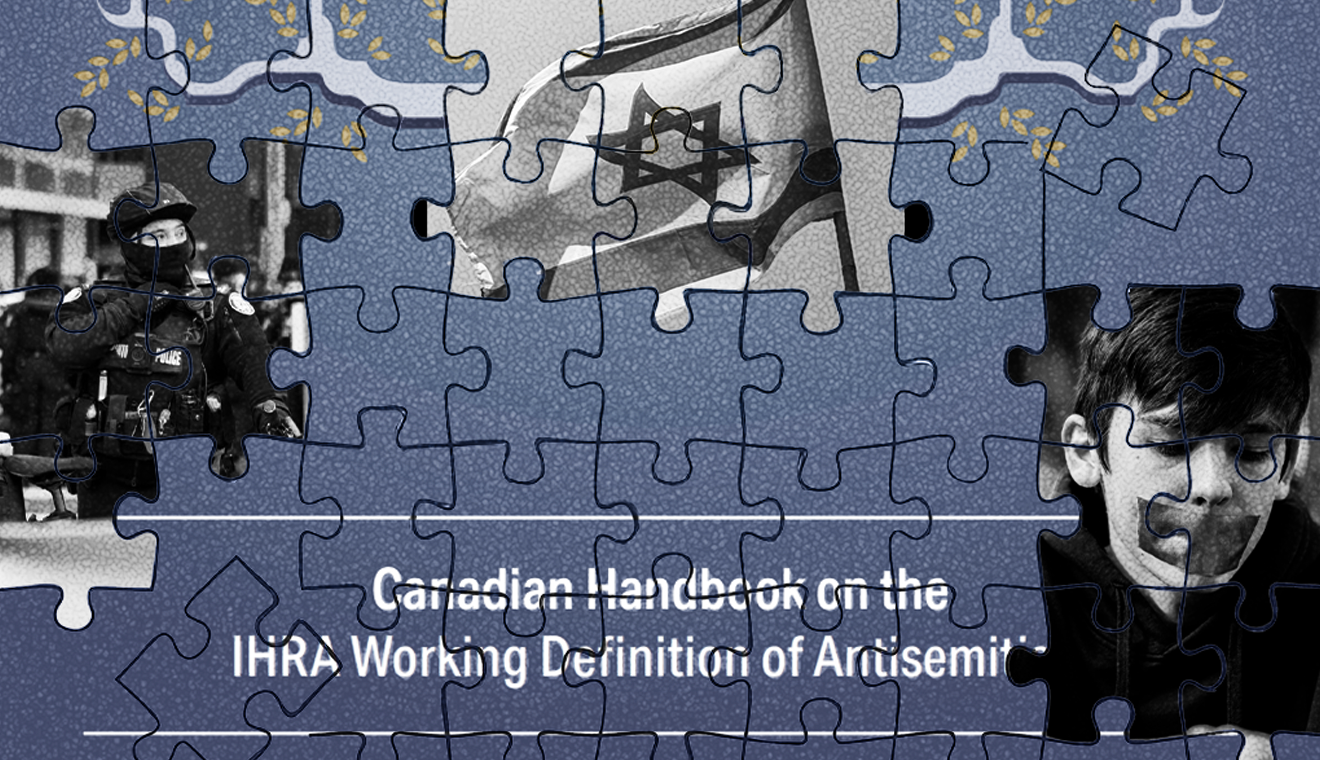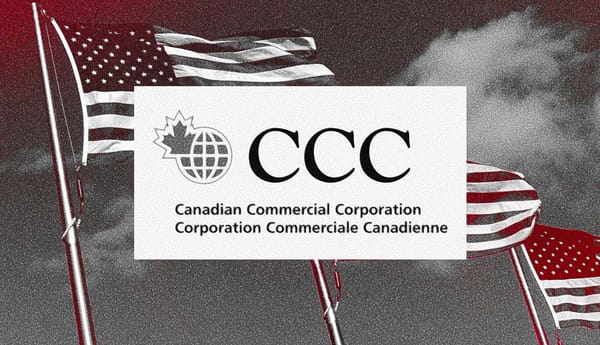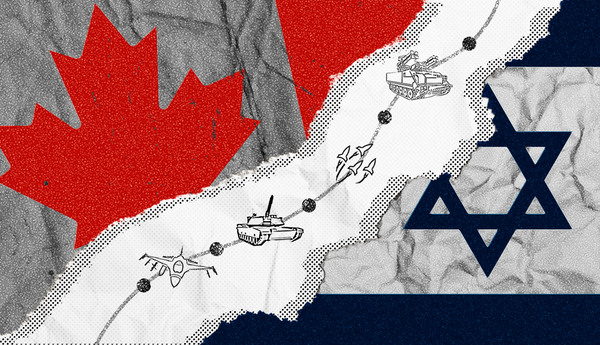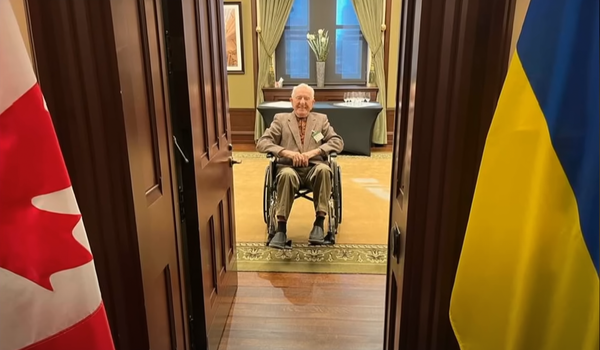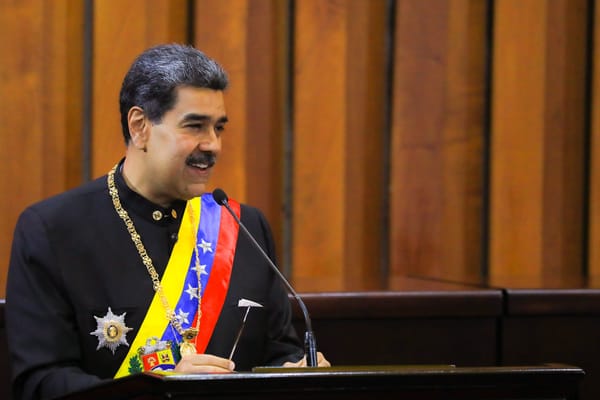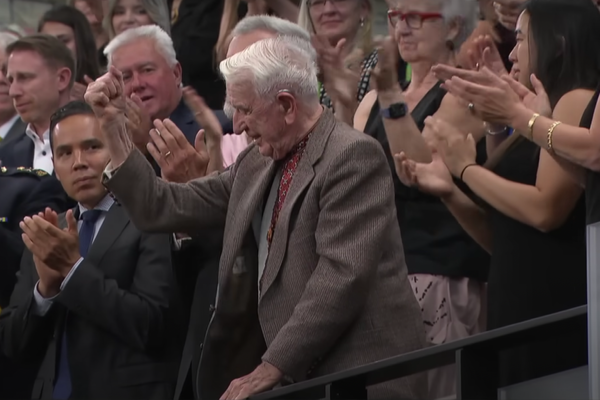The federal government published “The Canadian Handbook on the International Holocaust Remembrance Alliance (IHRA) Working Definition of Antisemitism” last fall.
Despite its seemingly mundane title, the handbook’s contents prompted a raft of criticism from pro-Palestine advocates and anti-Zionist Jewish groups.
The handbook, which had been two years in the making, described its purpose as being to help Canadians understand the IHRA working definition of antisemitism, and “to provide guidance on how to apply the definition.”
The handbook stressed that the definition is not legally binding and does not “displace existing legal standards.” Nonetheless, it explicitly aimed to provide “guidance” for law enforcement, the legal system, educational institutions, government programming, workplaces and civil society.
The Centre for Israel and Jewish Affairs (CIJA), Canada’s leading pro-Israel lobby group, celebrated the handbook’s publication, stating: “The Canadian IHRA Handbook provides essential insights into the Jewish community, its indigeneity to the land of Israel, and the ways in which antisemitism undermines Jewish lived experiences.”
But many of Israel’s critics strongly disagreed.
Independent Jewish Voices (IJV), an anti-Zionist and pro-Palestine group, said the handbook threatens “both Palestinians and Jews,” and called the IHRA definition of antisemitism “widely-discredited.”
IJV’s statement warned: “We believe the adoption of the IHRA working definition is itself antisemitic, because it conflates critique of Israel with racism toward Jews as a whole, and promotes anti-Palestinian racism.”
These criticisms can be traced back to the origin of what is now the IHRA definition more than 20 years ago.
This article tells the story of how the Canadian government’s official definition and handbook on antisemitism came to be, and how pro-Israel groups — including some who have defended Israel as it commits what is now widely recognized as a genocide in Gaza — directly influenced both from the outset.
The influence of those groups over the years perhaps made what critics argue is the handbook’s attempts to shield Israel from criticism all but inevitable.
The Making Of The IHRA Definition
The fact that pro-Israel groups were involved in developing Canada’s IHRA handbook is not surprising, since pro-Israel voices were also involved in the original crafting of the IHRA definition and continue to be its leading proponents.
IHRA is an intergovernmental organization with 35 member countries, including Canada. Different countries chair it on a rotating basis.
IHRA adopted a definition of antisemitism in 2016, after a European Union agency removed a very similar definition from its website, saying it could not establish a finalized version, according to a 2021 research paper by University of Oxford doctoral candidate Jamie Stern-Weiner.
The European agency had drafted its definition in 2005 in collaboration with the American Jewish Committee (AJC), a pro-Israel advocacy organization. AJC’s lead drafter of the definition, Kenneth Stern, has since denounced its use to police speech about Israel.
After the original definition was removed from the European agency’s website in 2013, pro-Israel groups like the Simon Wiesenthal Center spoke openly about how, in their view, “the absence of an accurate definition of anti-Semitism, which includes the vilification of Israel and falsely comparing Israel to the Nazis, will only encourage our enemies all over the world to intensify their efforts to delegitimize the Jewish state.”
In 2016, a new version of the original definition was brought to a meeting of IHRA’s plenary. It had two parts: a vague, two-sentence definition and 11 illustrative examples, seven of which concern Israel.
One of the examples stated that calling the “existence of a State of Israel [...] a racist endeavor” is antisemitic because it denies Jewish people their right to self-determination. Another example said that comparing contemporary Israeli policy to the actions of Nazi Germany is antisemitic.
The examples, though, weren’t adopted by IHRA’s decision-making body as part of the working definition of antisemitism. In fact, Stern-Weiner explained, the definition was only adopted after the examples were set apart from the short definition. Delegates from Sweden and Denmark objected to the examples and rushed process.
It is the examples, critics allege, that have emboldened Israeli embassies and pro-Israel advocates to push for the censorship of pro-Palestine speech and criticism of Israel across North America and Europe.
In 2017, a British university censored the title of a Budapest ghetto survivor’s speech following an intervention from Israel’s ambassador to the United Kingdom. She titled her speech: “You’re doing to the Palestinians what the Nazis did to me.”
The IHRA definition’s unadopted examples also played a key role in a scandal that dogged British MP Jeremy Corbyn’s leadership of the U.K. Labour Party. The scandal also reverberated in Canada.
Corbyn Affair Prompted Interest
Canadian media had little interest in IHRA’s definition of antisemitism until Corbyn’s party initially refused to adopt all of the IHRA examples in its code of conduct.
A search of a database of articles from more than 300 Canadian newspapers, including The Globe and Mail, the Toronto Star, and the National Post, found zero results for the term in 2016, the year the definition was partially adopted by IHRA.
In 2018, the definition was cited in Canadian newspapers in a series of opinion articles criticizing Corbyn. Former prime minister Stephen Harper co-authored one particularly biting column with the headline, “Corbyn’s anti-Semitism is a threat to all of us.”
He wrote: “It is the far-left’s obsession with Israel that concerns us most specifically. […] Today’s anti-Semitism all too often manifests itself in the singling out of Israel, depicted as a uniquely horrific place, responsible for all the ills of the Middle East, if not the world.”
Harper currently leads an investment firm that has poured hundreds of millions of dollars into developing military technologies in Israel.
Later in 2018, then-prime minister Justin Trudeau formally apologized for Canada’s refusal in 1939 to accept more than 900 Jewish refugees who had fled Nazi Germany. Hundreds of the passengers were later murdered in the Nazi Holocaust.
The pro-Israel group B’nai Brith Canada used the occasion of Trudeau’s apology to push for the government to commit to developing and implementing a plan to combat antisemitism, and to formally adopt the IHRA definition. Seven years prior, Harper’s Conservative government adopted a very similar declaration on combatting antisemitism known as the “Ottawa Protocol.”
The Trudeau government quietly adopted the IHRA definition in 2019 when it released an anti-racism strategy that also included definitions of anti-Black racism, anti-Asian racism and Islamophobia.
Notably, Canada’s document did not include IHRA’s 11 examples of antisemitism.
After Canada adopted the definition, pro-Israel groups like CIJA lobbied federal institutions for the definition to be cited in trainings of attorneys general, prosecutors and police, and to guide a strategy against online hate and radicalization.
Then, in November 2020, Trudeau’s office announced the creation of a “Special Envoy on Preserving Holocaust Remembrance and Combatting Antisemitism” and named former cabinet minister Irwin Cotler as the inaugural holder of that position.
One of Cotler’s main tasks, according to the prime minister’s announcement, was to “support advocacy and outreach efforts with Canadians, civil society, and academia to advance the implementation of this [IHRA] definition across the country and its adoption internationally.”
In 2021, Trudeau said the special envoy role would be made permanent, a move applauded by pro-Israel groups including CIJA, which said it had advocated for such an announcement.
Deborah Lyons was appointed as Cotler’s successor as special envoy in October 2023 (she quit the position this summer before the expiry of her term, and the role currently remains vacant with no date announced for her replacement).
Lyons was accused by critics of “defaming” the Palestine solidarity movement in her role as special envoy. She formerly served as Canada’s ambassador to Israel, and gained notoriety when she hosted a pizza party for Canadians serving in the Israeli military in 2020.
The Maple contacted Lyons for comment for this story, but received no reply.
Midway through Cotler’s term as special envoy, Trudeau announced that Canada would produce a handbook on antisemitism as a companion to the IHRA definition. The handbook was ultimately published in October 2024 during Lyons’ term and in the midst of Israel’s genocide in Gaza.
The handbook reproduces IHRA’s examples and takes them further, placing criticisms of Zionism in the context of Israel’s genocide in Gaza next to antisemitic slurs, threats, and Nazi Holocaust denial. The handbook includes an Instagram post reading, “Zionism is a racist & violent settler-colonial project,” as a case study of antisemitism.
Palestinians, anti-Zionist Jews, academics and many others called out the handbook as harmful.
“IHRA’s definition of antisemitism is functionally useless and its examples give legitimacy to racist anti-Palestinian ideas,” said activist Sarah Boivin at an IJV webinar about the handbook held in June.
There is essentially a consensus among genocide scholars and human rights organizations that Israel is committing a genocide in Gaza, said Joshua Sealy-Harrington, an associate professor and chair of equality law at the University of Windsor’s Faculty of Law, at the same webinar.
There is also near-consensus on the fact that Israel commits apartheid or racial segregation, Sealy-Harrington said. But if calling Israel a racist country is antisemitic, then it would be considered offensive to state these facts, he argued.
“During a year where international legal consensus finally caught up to the Palestinian reality of Israeli oppression … Canada could have simply made innocuous commitments to begrudgingly comply with domestic and international law. Instead, it published a government handbook that labels the mere naming of Israel’s overt criminality not just inaccurate but antisemitic,” he said.
“It casts not just anti-Zionism but international law and in particular Palestinian human rights as antisemitic. … [It is] an Israel immunity handbook and must be understood as such.”
The Making Of The Handbook
The handbook’s defence of Israel and Zionism aligns with the views of the groups who helped craft the document.
Documents obtained by The Maple through access to information requests show the author of the handbook prepared a work plan that included partnering with three influential pro-Israel groups who would “submit content directly” during the drafting process.
While pro-Israel groups were to be asked to contribute, the copy of the work plan obtained by The Maple did not mention partnering with or seeking feedback from groups that are regularly critical of Israel or Zionism, Israel’s founding ideology.
IJV told The Maple it was consulted during the latter stages of the handbook’s preparation. Canadians for Justice and Peace in the Middle East, a pro-Palestine advocacy organization, also met with the special envoy’s office to share its concerns about the IHRA definition.
The work plan was prepared under a letterhead belonging to Goodmans LLP, a Toronto law firm whose employee was contracted by Canadian Heritage to draft the handbook. Noah Lew, who is currently an associate at Goodmans, has publicly identified himself as the “lead drafter” of the handbook.
The published handbook states: “Over 150 individuals were consulted, including Jewish community leaders, the Canadian Delegation to the IHRA, rabbis, academics and teachers, lawyers, civil servants and political staff, and law enforcement personnel.”
It adds: “Numerous experts on antisemitism were included in the consultations.”
A draft of the handbook reviewed by The Maple indicated that some of those experts’ affiliate organizations were originally due to be given an honourable mention in the document’s preamble, yet the published version did not name any of the groups that were consulted.
Several groups were, however, named during the document’s planning phases.
A “proposal and work plan” submitted by Goodmans to Canadian Heritage detailed some of the steps the author planned to take during the drafting process. The plan stated:
“The Handbook drafting process will involve consultation with — and input from — leading Jewish-Canadian organizations. Three organizations, the Centre for Israel and Jewish Affairs (‘CIJA’), B’nai Brith Canada (‘B’nai Brith’), and Friends of Simon Wiesenthal Centre (‘FSWC’), will be asked to submit content directly during the drafting process…”
The work plan continued that feedback and commentary on a draft of the handbook would be solicited from “multiple other organizations, including the Canadian Jewish Political Affairs Committee (‘CJPAC’), the RWCHR [Raoul Wallenberg Centre for Human Rights], and the Canadian entities of Hillel International (‘Hillel’) and BBYO Inc. (‘BBYO’).”
It is not clear who ultimately decided what groups would be consulted. Internal emails sent between Canadian Heritage employees in February 2024 stated that Lyons’ office was to “provide a list of organizations and individuals who will engage in the consultation.” The email stated that “up to 20” organizations would be selected.
However, Canadian Heritage’s access to information team advised The Maple in September that no such list currently exists in the department’s records.
The Maple emailed all of the groups named in the work plan for comment, but none replied.
All of the groups publicly identify themselves as supportive of Israel and some regularly denounce pro-Palestine speech and anti-Zionism as antisemitic.
Some have also claimed that efforts to sanction or charge Israel and its leaders for war crimes at international courts could be harmful to Canadian Jews, and have suggested that recognizing the existence of anti-Palestinian racism threatens Jewish rights.
The Organizations
CIJA, Canada’s most prominent pro-Israel organization, describes itself as Zionist and committed to “strengthening the Canada-Israel friendship.”
B’nai Brith, an advocacy group that says it is dedicated to combating antisemitism and “hatred in all its forms,” is a self-described “staunch defender of the State of Israel.”
It has recommended that the government of Canada “unconditionally support Israel’s efforts to nullify the extra-territorial threats currently compromising its security,” and has also encouraged its supporters to purchase Israel bonds and to donate to Israeli charities.
The 2024 edition of its “annual audit of antisemitic incidents” denounced pro-Palestine protesters at university campuses for having “regularly demonized Zionists” and said contemporary Jews in general face a form of hatred that “condemns them for their Zionist beliefs.”
Both CIJA and B’nai Brith have claimed the International Criminal Court’s issuing of arrest warrants for Israeli Prime Minister Benjamin Netanyahu and former defence minister Yoav Gallant over alleged crimes in Gaza are used to fuel or justify antisemitism.
CIJA also claimed last year that the passage of a non-binding motion in Parliament that included a call to stop exporting arms to Israel “could be used to further embolden the antisemitic protests we have seen targeting the Jewish community under the guise of demonstrating against Israel.”
B’nai Brith’s director of advocacy and research claimed in January 2024 that “there is the legitimate potential” that the International Court of Justice’s (ICJ) provisional judgement regarding South Africa’s genocide case against Israel “will have an adverse impact on Canadian Jewry.”
Both CIJA and B’nai Brith have condemned moves to recognize the existence of anti-Palestinian racism in Canada. B’nai Brith claimed last year that “Palestinians are not a racial group,” and that “this dangerous expansion of the definition of racism will censor open discussion of Jewish identity, history, and the right to self-determination.”
FSWC’s website has a page dedicated to “standing with Israel,” and organized its first ever “solidarity mission” to Israel last summer in the midst of Israel’s genocide.
Michael Levitt, FSWC’s president and CEO, wrote a Toronto Star column last year that claimed “activists” denounce Zionists as a stand-in for “Jews” in order to “make their poison seemingly more palatable to the wider public.”
FSWC claimed that by not opposing South Africa’s genocide case against Israel at the ICJ, Canada “emboldens those peddling toxic antisemitism.”
CJPAC, Hillel and BBYO are all explicitly pro-Israel organizations. RWCHR’s founder, Irwin Cotler, is a well-known defender of Israel, has condemned the genocide case against it and, as noted above, served as Canada’s inaugural special envoy on preserving Holocaust remembrance and combatting antisemitism before Lyons.
Lew, the IHRA handbook’s self-identified lead drafter, is himself listed as a RWCHR governing board member and serves as a “special advisor” to Cotler, according to Lew’s LinkedIn.
Some of the above organizations publicly indicated they had a role in helping put together the handbook. Upon the handbook’s release, CIJA stated: “During the Handbook’s development, CIJA and other Jewish organizations gathered testimonials that reflect the community’s collective experiences with antisemitism in Canada.”
B’nai Brith tweeted that they were “proud to have collaborated with the Special Envoy [Deborah Lyons] to create the IHRA Handbook.”
It is unclear how many anti-Zionist organizations or groups that are regularly critical of Israel or support legal challenges against its conduct were involved in the handbook’s consultation process.
As noted above, IJV said it was consulted during the latter stages of the document’s preparation.
IJV’s national coordinator, Corey Balsam, told The Maple it is unusual for his organization to be invited to participate in such initiatives, but they were given an opportunity to review a draft of the handbook at a Global Affairs Canada office last spring.
There were some examples of alleged antisemitism that Balsam noted in the draft document that were not published in the final version, he said.
It is not surprising, Balsam added, that pro-Israel groups were slated to play a central role in the handbook’s drafting process.
“I think what we’ve seen from the special envoy is that it really is a kind of internal Israel advocacy organ of the government,” he said, noting that the organizations named in the planning process also have the largest lobbying capacity among Jewish advocacy groups.
“It just seemed like the government really relied on these organizations to set the [handbook’s] frame and the content, rather than having kind of their own approach to this.”
In an appendix, the handbook acknowledges criticisms of the IHRA definition — including that it allegedly silences criticism of Israel and is contrary to freedom of expression — but dismisses these as “misconceptions,” and suggests that levelling such critiques may echo “antisemitic tropes of Jewish power and control.”
The handbook also claims that noting critiques of the IHRA definition by one of its lead drafters is “a simple factual inaccuracy.” However, the handbook does not explicitly deny Stern’s public criticism of the definition, instead emphasizing that the definition had “many drafters and contributors.”
Records obtained by The Maple indicate the special envoy’s office consulted with the Department of Justice to ensure the handbook is “Charter compliant.”
The Contract
According to partially redacted copies of invoices obtained by The Maple, Goodmans LLP billed Canadian Heritage approximately $35,700 for drafting the handbook. The invoices indicate the firm’s work included corresponding or meeting with “partner organizations” on 12 separate days between Dec. 1, 2023 and Jan. 29, 2024.
A sole source contract “justification form” prepared by Canadian Heritage states that the contractor’s profile “meet’s [the department’s] needs,” in part because of his expertise and “demonstrated experience working with key Jewish community organizations and stakeholders.”
The justification form added: “The approach and methodology of the contractor are complementary to the Government of Canada’s vision and perspective.”
In addition to his roles at RWCHR and assisting Cotler, Lew made headlines as a university student at McGill in 2017 when he claimed he was “blocked from participating in student government because of my Jewish identity and my affiliations with Jewish organizations.”
A group of pro-Palestine students had organized to block the re-election of Lew and one other candidate for the student board of directors because of their support for a decision finding that boycott, divestment, and sanctions motions violated the McGill student constitution, according to commentary on the incident that was published by Mondoweiss in 2022.
An investigation initiated by McGill concluded that antisemitism was not a factor in the vote, and that Lew’s pro-Israel positions were the main reasons for fellow students opposing his reelection.
More recently, Lew and Cotler co-authored a National Post column criticizing the Liberal government’s decision to recognize the State of Palestine.
The Maple emailed Lew and Goodmans a list of questions for this story, but did not receive any response.
Time constraints and “optics” were cited by Canadian Heritage as another justification for sole-sourcing the contract.
“The optics of further delays to Canadian institutions’ use of the definition could harm government’s efforts to fight antisemitism and racism in general,” the justification form read.
A comment on the form indicates that an earlier version also suggested sole-sourcing the contract was necessary on the basis that drafting the handbook was a “pressing emergency,” a category applicable to situations like “an actual or imminent life-threatening situation.”
That justification and its reasoning appears to have been struck off and redacted by the department. A note on the document stated that “this requirement does not meet the definition of an emergency.” The form also states that the contract was undertaken at a “reduced rate.”
Canadian Heritage did not respond to an emailed list of questions from The Maple for this story.
‘It’s A Zionist Tract’
The production of the handbook, said Balsam, resulted in a document that is unbalanced and fails to properly account for the substantial opposition that exists to the IHRA definition.
He noted that the handbook’s appendix lists adoptions and endorsements of the definition — including by provincial and city governments — but does not name any organizations that have opposed it.
“It’s a Zionist tract,” said Balsam of the handbook. “It is a political document that is seeking to carry out this agenda, moving from basic adoption of the definition to actually applying it throughout the country.”
Sealy-Harrington, in an interview with The Maple, warned that despite the handbook’s assurance that it does not displace existing legal standards, it nonetheless represents a “creep of soft law into hard law.”
“They clearly want it to wield legal authority, but they disclaim it because they’re trying to both influence law and policy without being subject to a constitutional or legal challenge,” said Sealy-Harrington.
He noted the example of policing. “They clearly want police officers to understand antisemitism to mean or to include criticism of Israel. And so by virtue of that, they want the ways in which the law is enforced to be influenced by this document.”
“What they’re actually trying to do is shift culture on antisemitism as a collateral mechanism for legal reform,” and to enable the IHRA definition to be enforced even in settings where it has not been formally adopted, Sealy-Harrington explained.
This includes universities, where the definition has in many cases been rejected.
“The number of credible antisemitism scholars who accept IHRA is vanishingly few,” Sealy-Harrington added.
“What [IHRA] is is a document that has been embraced by Western colonial institutions, which, if anything, is authority that undermines its credibility as a document related to anti-racism.”
“When they talk about the supposed authority of the IHRA definition, what they mean is Israel and its allies.”


